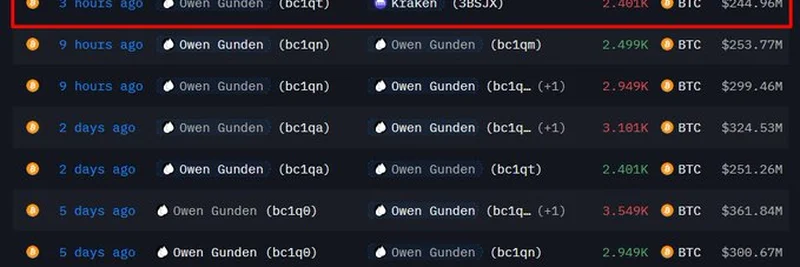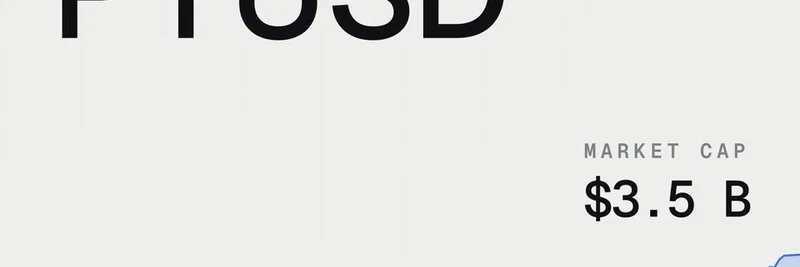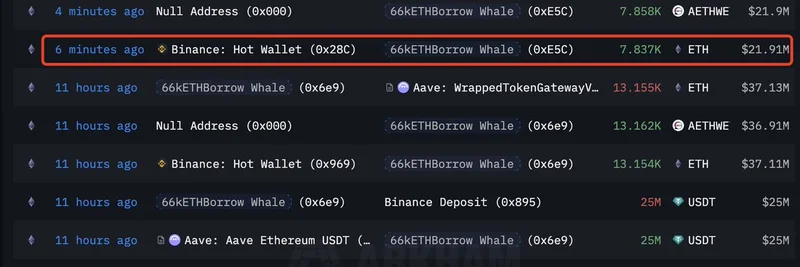In the fast-paced world of cryptocurrency, big moves by early adopters can send ripples across the entire market. Recently, a tweet from crypto analyst Mr. Whale highlighted one such event: Owen Gunden, an original (OG) Bitcoin whale, has fully exited his position, selling off all 11,000 BTC he's held since 2011 for a staggering $1.3 billion.
Who Is Owen Gunden and Why Does This Matter?
Owen Gunden is one of Bitcoin's earliest holders, often referred to as a "whale" because of his massive holdings. Whales are individuals or entities with large amounts of crypto that can influence market prices through their buys and sells. According to on-chain data from platforms like Arkham Intelligence, Gunden started liquidating his stash in late October 2025, culminating in a final transfer of about 2,499 BTC—worth roughly $230 million—to Kraken's hot wallet.
This isn't just a personal cash-out; it's a signal in the broader crypto ecosystem. Gunden's wallet, identified as bc1qm..., had been dormant for years, making his sudden activity noteworthy. As reported by Cointelegraph, this move comes amid increasing institutional control over Bitcoin through exchange-traded funds (ETFs), suggesting early holders might be stepping aside for big players like BlackRock and Fidelity.
Breaking Down the Transactions
The tweet shared a screenshot from a blockchain explorer showing the key transfers:
- 14 hours ago: From Owen Gunden (bc1qm...) to an intermediate address (3Jhb...), 2.499K BTC valued at $227.94M.
- 13 hours ago: From the intermediate address to Kraken's hot wallet (bc1qx...), another 2.499K BTC at $230.18M.
These large inflows to exchanges like Kraken often precede sales, as whales convert crypto to fiat or other assets. Over the past month, Gunden offloaded his entire 11,000 BTC, turning what was once a modest investment into billionaire status. For context, if he bought in 2011 when BTC was around $1–$30, his returns are astronomical—think 100,000x gains.
Implications for the Crypto Market
When a whale like Gunden dumps, it can pressure prices downward, especially if it triggers fear, uncertainty, and doubt (FUD) among retail investors. Bitcoin was hovering around $86,000 recently, per CoinMarketCap, but such sells could contribute to volatility. Interestingly, this coincides with technical sell signals like the TD Sequential indicator flashing red, as noted on Coinpaper.
But why care on Meme Insider? Meme tokens, those fun, community-driven coins like Dogecoin or newer ones on Solana and Base, often move in tandem with Bitcoin. A BTC dip can suck liquidity out of alts, causing meme prices to plummet. On the flip side, if whales are cashing out BTC, some of that capital might flow into riskier assets like memes, seeking the next big pump.
How This Affects Meme Token Enthusiasts
For blockchain practitioners and meme token holders, this is a reminder of market cycles. As institutions tighten their grip on BTC via ETFs—now holding billions—meme tokens remain the wild west, where retail can still drive massive gains. If Gunden's exit signals a top for BTC, it might be time to diversify into memes with strong communities or innovative tech.
We've seen similar patterns before: In 2021, whale sells preceded corrections, but memes like SHIB exploded afterward. Keep an eye on on-chain metrics and tools like DexScreener for emerging trends. If liquidity shifts, memes could see inflows as traders chase high-risk, high-reward plays.
In summary, Owen Gunden's full exit is a milestone in Bitcoin's maturation, but for the meme token space, it's an opportunity to adapt and thrive amid shifting tides. Stay informed, and remember: in crypto, whales swim, but communities surf the waves.




